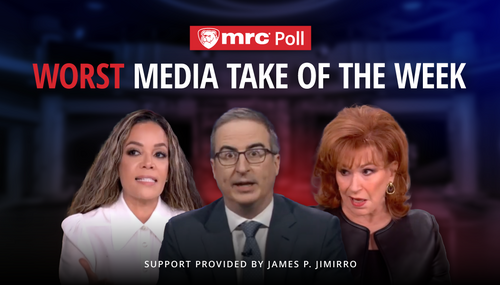On Morning Joe, Major Garrett, formerly of Fox News, now with the National Journal, claimed to be "militantly non-partisan" . . . then proceeded to offer a passionate defense of President Obama's Libya policy.
As an hors d'oeuvre during the discussion of the need for the media to acknowledge their leanings, Katrina vanden Heuvel risibly refused to admit that her Nation magazine is left-wing.
View video after the jump.
Garrett repeatedly put his defense of the Obama policy in the mouths of Hillary Clinton and other administration figures. But the passion in his voice, and his occasional personal editorializing, left little doubt that he comes down strongly on the Obama side.
At one point, Mika Brzezinski, who for some time has advocated greater media transparency about its political leanings, tried to get Garrett to state his political orientation. But Garrett willfully chose to misinterpret Mika's question, answering that he was "a reporter." Right.
KATRINA VANDEN HUEVEL: Every human being has a world-view, and I think what Fox doesn't do is that it doesn't acknowledge that it has a very, very, very strong point of view. At The Nation we are up front.
MIKA BRZEZINSKI: Yeah, like you're left--sometimes a lot left.
VANDEN HEUVEL: Independent, trans-partisan.
So Katrina claims The Nation to be "up front," but refuses to embrace Mika's description of the magazine as leftist.
MAJOR GARRETT: I'm at the National Journal now; I'm very proud to be there. [Publisher] David Bradley gives us one mandate: to be militantly non-partisan, and I'm very happy to be there.
Mika then tried to get Garrett to acknowledge his personal political preference. Watch how he deflects the question.
BRZEZINSKI: OK, but you are a [as in Dem, Republican, etc.]?
GARRETT: I'm a reporter. I'm accountable. I've been transparent about my reporting my whole life. Everything I've done is held up to scrutiny, and I invite it.
A bit later . . .
VANDEN HEUVEL: There are a lot of questions here and I don't think this country can afford to be in another, third, war with an Arab country.
BRZEZINSKI: The Arab awakening, though, is another dynamic here.
VANDEN HEUVEL: One that is harmed, I think, by this U.S. intervention.
GARRETT: We don't know if it is harmed, or helped. What we do know is that the administration thought that it had one choice, and one choice only: [note the rising fervor in Garrett's voice] to preside over, silently, a slaughter of innocents in Benghazi. That was the alternative. No mercy meant no mercy, and the administration came to believe, very strongly, that Khadaffi would eliminate an entire city and its populace to prove a point, to prove a brutal dictator's point, which has happened before in history.
Note: by this point, Garrett seems to have abandoned any real pretense of reporting and is making his own impassioned argument in favor of intervention.
GARRETT: If you look at Samantha Power, Susan Rice,Hillary Clinton--all from the Clinton era--who painfully remember--Samantha Power wrote a very important book [Ed.--good blurb material, Samantha!] about what did not happen in Rwanda. They said: forget all these strategic questions, mission creep--we can deal with all that later --
Right! That's what we want: an administration that decides to "forget all these strategic questions" before using military force!
GARRETT: Saves lives now, and make a point, and then move forward.
VANDEN HEUVEL: But the mission has changed, Mika. I mean, it was originally civilian protection. What is it now? Well now --
GARRETT: -- they believe they can figure it out on the fly. On Wednesday of next week, Secretary Clinton, Defense Secretary Gates, are going to brief Capitol Hill. By then, the U.S. role will be much more diminished, the president, I predict, will have said something much more clear about his intentions and what's going forward. So by the time this big briefing happens on Wednesday, the administration will have more answers than it does now, a different military posture, strong NATO control over this, and a different trajectory.
Wow: talk about your rosy scenario! Mika stepped in to ask a good question.
BRZEZINSKI: Is that out of step, though? To have clarity on intent two weeks in, Mike Barnicle? I mean, that is a fair, I think, criticism, that our intent is confused, at least in terms of the message.
MIKE BARNICLE: They're bending over backwards in Washington not to declare this a war, and yet everything visually that Americans see and hear: it's a war.
Garrett would brook no such criticism.
GARRETT: There are American troops, and from the perspective of Hillary Clinton and Samantha Powers and Susan Rice, they deserve an opportunity to fight for their future. Without the intervention from the West, there would never have been that chance.
Major didn't mention himself, but it sure sounds like he shares their perspective.




